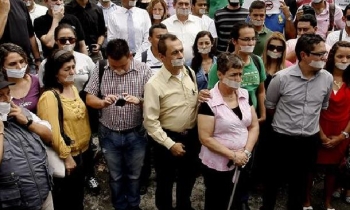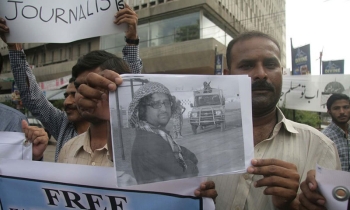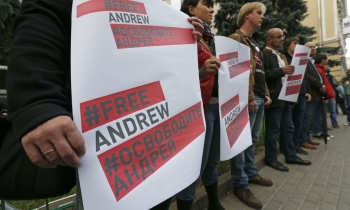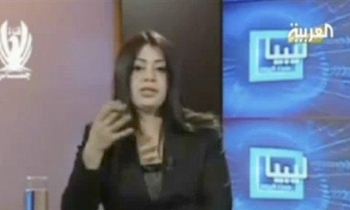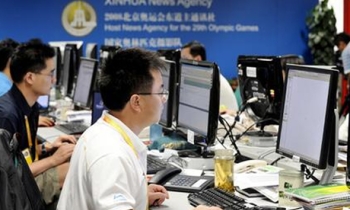It seems to be becoming a habit of the US — an Afghan journalist working for Canada's CTV television network in Afghanistan has been designated an unlawful enemy combatant. The journalist, Jawed Ahmad, has been held without charge for the past four months at the US military compound in Bagram, 50 km north of Kabul.
Major Chris Belcher, a spokesman for the US-led coalition, said that an "enemy combatant review board" had "credible information" that Ahmad, who also reports for the Toronto Star, was dangerous to foreign troops and the Afghan government, the Associated Press (AP) reported. Belcher declined to provide details about the information.
Belcher also refused to say where the review took place or if Ahmad had been represented by counsel. "He was afforded an opportunity to provide a statement to the board, and the board determined there was credible information to detain him as an unlawful enemy combatant," he said.
Paris-based Reporters sans Frontières (RSF) has voiced at the US military’s designation of Ahmad, as an "enemy combatant". It said, "If the US military is going to make this kind of accusation, it should be based on material evidence and not just the findings of a mysterious panel of interrogators. We once again fear that the US military is confusing journalistic work with spying for the Taliban".
It is common for journalists in Afghanistan to have contact information with Taliban spokesmen so they can seek comment on news stories.
According to the New York-based Committee to Protect Journalists (CPJ), Ahmad, a locally hired journalist for Canadian television network CTV in Afghanistan’s southern provincial capital of Kandahar, was arrested on October 26 at the air base in that city that is used by International Security Assistance Force troops. He was transferred some time after that to the US-run detention facility at Bagram Air Base in the north of the country.
“Although the Pentagon has made a very serious assertion, it has yet to disclose any supporting evidence. And despite holding Ahmad for four months, authorities have yet to charge him with a crime,†said CPJ Executive Director Joel Simon. “We urge military officials to either charge Ahmad with a recognisable criminal offense or, if they have no intention of doing so, to release him immediately.â€
Ahmad, also known as Jojo Yazemi, is believed to be 22. US military officials had previously confirmed his detention but declined to give details. Ahmad’s brother disputed the military’s characterisation in an interview with CPJ.

“All the journalists in Kandahar know him and know he is a journalist. He didn’t do anything wrong,†Jawed’s brother, Siddique, told CPJ through a translator. He said the military did not notify the family that Ahmad had been designated an enemy combatant. Siddique last had contact with his brother though a video link supplied by the International Committee of the Red Cross on January 29.
A local journalist who works for an international news organisation in Kandahar, who asked to remain anonymous because he was not authorised to speak about the case by his employer, told CPJ that fellow reporters were concerned by Ahmad’s detention. “We don’t know why he was arrested,†he said. “We just know that he was our colleague.â€
Whitman said the case had gone before an enemy combatant review board, and that Ahmad had been given a chance to make a statement. He said the review board would examine the case periodically. It was unclear whether Ahmad had a lawyer.
The Pentagon did not specify when the military made the “combatant†designation. The February 22 letter to CPJ was the first time the Pentagon had disclosed the designation.
CPJ research shows the US military has engaged in a pattern of open-ended detentions of journalists in Iraq and South Asia. “We’re alarmed by this recurring practice in which journalists are held for prolonged periods during which US officials refuse to detail the basis for a detention or provide any recognisable due process,†said CPJ’s Simon.
Sami al-Haj, a Sudanese cameraman for the Al-Jazeera news channel, has been designated an “unlawful enemy combatant†and held by US authorities for more than six years, most of that time at the Guantanamo Bay detention facility. US authorities have yet to charge al-Haj with a crime or disclose any evidence against the journalist.
In Iraq, dozens of journalists have been detained by US troops, according to CPJ research. While most have been released after short periods, in at least eight cases documented by CPJ Iraqi journalists have been held by US forces for weeks or months without charge. Several of the detainees were photojournalists who initially drew the military’s attention because of what they had filmed or photographed.
"CTV News continues to be deeply concerned about Jojo Yazemis well being," the network's president Robert Hurst said, according to Agence France-Presse (AFP). "We are continuing to work all diplomatic channels available to find out additional information and get Jojo his due process." "It is distressing to hear allegations such as these without being shown a single piece of supporting evidence," Mitch Potter, the Star's European bureau chief, said in its pages.

